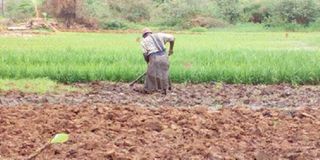Tanzania now shifts to agriculture to tame poverty

What you need to know:
The government spells out strategies through which agriculture can spur economic growth and tame poverty among Tanzanians through modernization and commercialization and thus enable the country attain the middle income status in a decade to come
Arusha. Agriculture, the main driver of the economy, has to be highly modernized and commercialised to enable Tanzania to attain a middle income status by 2025.
Ideally, the sector should grow at between eight and ten percent in order to move majority of Tanzanians out of poverty, a senior government official hinted here yesterday.
"This is why the government has put in place strategies to ensure the sector is commercialized, modernised and made profitable", said David Biswalo, the director of policy and planning in the ministry of Agriculture.
He said at the start of consultative talks on Tanzania Agribusiness Mapping that agriculture already has great potential for growth and comparative advantages when different parametres are factored in.
For instance, growth of the sector, currently accounting for 30 per cent of the Gross Domestic Growth (GDP), has been at four per cent compared with the population growth of 2.8 per cent.
The sector plays a significant role in inflation control as more than 95 per cent of food requirements in the country are obtained from locally produced crops.
It also provides 65 per cent of industrial raw materials in the country and contributes about 30 per cent of the export earnings.
Mr. Biswalo revealed that new strategies to turn around the sector's growth to the national economy included the recently developed Tanzania Business Enabling Environment Support (BEES) programme with the support of the World Bank Group.
The second pillar of the programme would focus on agri-business, specifically supporting investment generation and the fast growing horticulture value chain.
The programme is being implemented by the Finance, Competitiveness and Innovation (FCI), a joint Global Practice of the World Bank and the International Finance Corporation (IFC).
Efforts would be made to ensure that small scale farmers access production inputs at reasonable costs in a programme which would also involve the Small Industries Development Organization (Sido).
A consultant with the World Bank Dr.Augustine Langyintuo said deliberate strategies would be taken under BEES to support the horticultural sector which currently employes about 2.5 million people.




